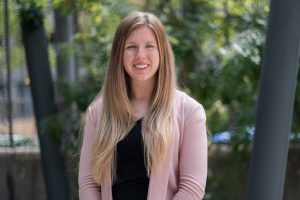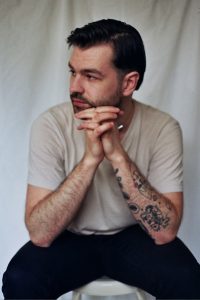Deanna Reder proposes using Coast Salish protocols to introduce ourselves as we are on Coast Salish land. “When speaking in a group, we were taught to introduce ourselves in relation to our families and to the land and its peoples. A Coast Salish person, for example, would identify himself by his name, and if applicable, a ceremonial name often linked to his ancestors, and also would identify where he is from.” (Reder 131). In respect of this important tradition, we have included this information in our biographies below.
Katarina
My name is Katarina and I would like to acknowledge, with gratitude, that I stand on unceded Musqueam territory. My family comes from the Comox Valley, on Vancouver Island, I am a guest on this land.

Katarina Smith is a passionate educator working towards making STEM fields accessible, exciting, and relevant to all. In her work with UBC Geering Up Engineering Outreach, she has the pleasure of engaging thousands of teachers and youth annually in STEM experiences. She completed her BSc Integrated Sciences at UBC in 2018 where she studied Behavioural Genetics. Her interest in this research topic relates to her desire to help repair inequalities she has observed in education systems across the country – graduation rates remain significantly lower for Indigenous students, and she is keen to learn about the systemic issues contributing to this inequality. She believes the more we understand the historical and contemporary issues, the sooner we can decolonize Canada.
Photo by Angela Leung
Jacob
My name is Jacob Kosh and I was born on the unceded traditional territory of the K’òmoks First Nation, and is of Scottish/Portuguese settler heritage. I have lived predominantly on unceded traditional Lekwungen as well as Coast Salish territories.

Jacob is a fourth-year English Literature student at the University of British Columbia. He is studying to become a high school English and Art teacher, and besides literature he has a passion for visual art. Having shown in numerous exhibitions and published works, Jacob hopes to extend his joy of literature and art to future students with the hopes of inspiring new generations of thinkers and creatives. While furthering his studies Jacob acknowledges that this opportunity is only possible because of Canada’s complex history, and he is deeply grateful to be able to continue his life here while reconciling with this land’s intricate past. Only by engaging with Indigenous histories and stories can we develop further as a complete society, and as settlers Jacob believes we need to elevate those voices and cultures in every way we are capable.
Photo by Astrid Helmus
Eva
My name is Eva and my family migrated from Australia to live in Vancouver. We are guests on the traditional, ancestral, and unceded territory of the Musqueam people.
Eva Dvorak is a third year English Literature Major at the University of British Columbia, on the traditional, ancestral, and unceded territory of the Musqueam people. She was born and raised in Vancouver, close to the university campus and Pacific Spirit Park. She is pursuing a career in veterinary medicine but is doing so while completing an English degree. Her interests in English lie within Canadian literature and Indigenous literature, especially speculative fiction within these areas. She is also interested in representations of animals in literature and the cultural significance of different species within stories. She hopes to continue to educate herself further on settler-colonialism in Canada, both historically and in present contexts. By doing so, Eva aims to support the decolonization of Canada.
Cooper
My name is Cooper Asp and my family comes from a broadly European diaspora spread across North America.
Cooper Asp is a fourth year English Literature Major at UBC. He was born in San Diego, CA, and has lived in six different states in the US as well as in Vancouver, BC. His literary interests are 19th century Russian literature, as well as 18th-19th century English poetry and medieval texts. Though pursuing a bachelor’s in literature, he plans on joining the US military as an officer upon graduation. As an American, he is unfamiliar with the history and struggles of Canadian Indigenous peoples and has enjoyed experiencing their stories through indigenous literature.
Deanna Reder
Deanna Reder (Cree-Métis) is Chair for the Department of Indigenous Studies and is a member of the Department of English. She is Principal Investigator, in partnership with co-applicants Dr. Margery Fee and Cherokee scholar Dr. Daniel Heath Justice of the University of British Columbia, on a five-year Social Sciences and Humanities Research Council (SSHRC) funded project for 2015-2020 called “The People and the Text: Indigenous Writing in Northern North America up to 1992.” She is a founding member of the Indigenous Literary Studies Association (ILSA) and served on the ILSA council from 2015-2018; currently she is co-chair, with Professor Sophie McCall, of the Indigenous Voices Awards. She also is the Series Editor for the Indigenous Studies Series at Wilfrid Laurier University Press.
Works Cited
Reder, Dianna. Department of English, Simon Fraser University, www.sfu.ca/english/faculty-staff/profiles/deanna-reder.html. 22 Mar. 2020.
